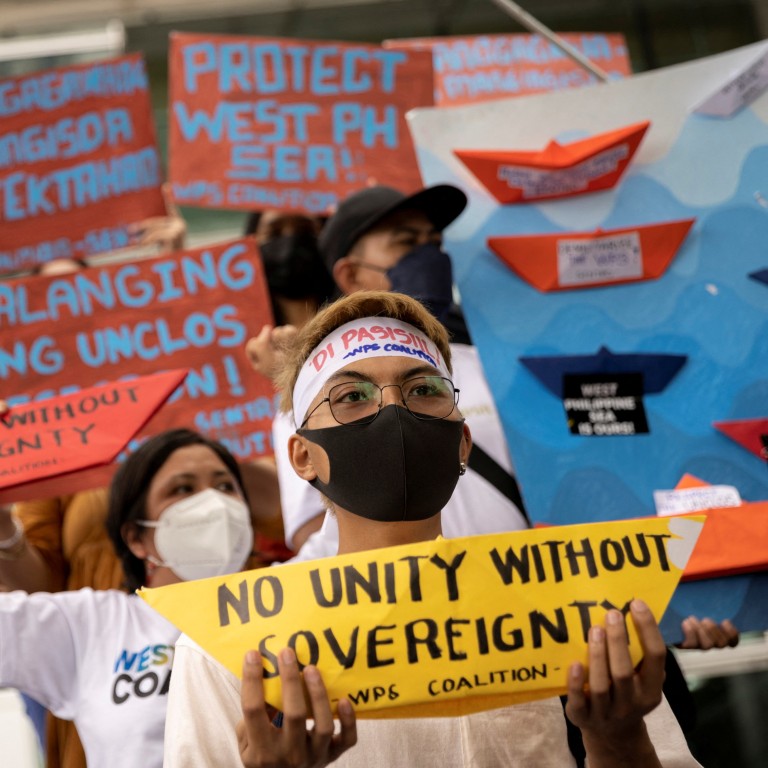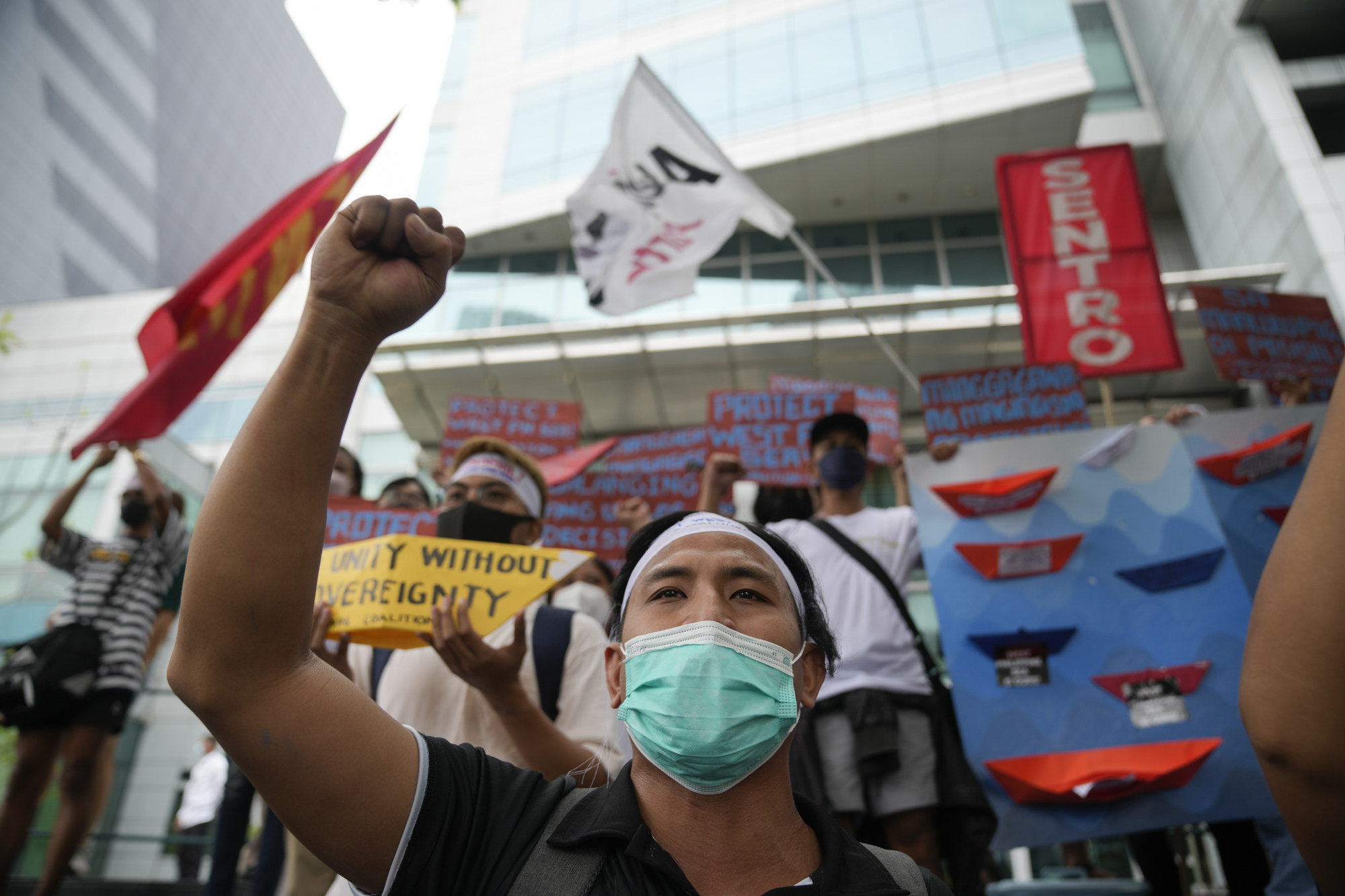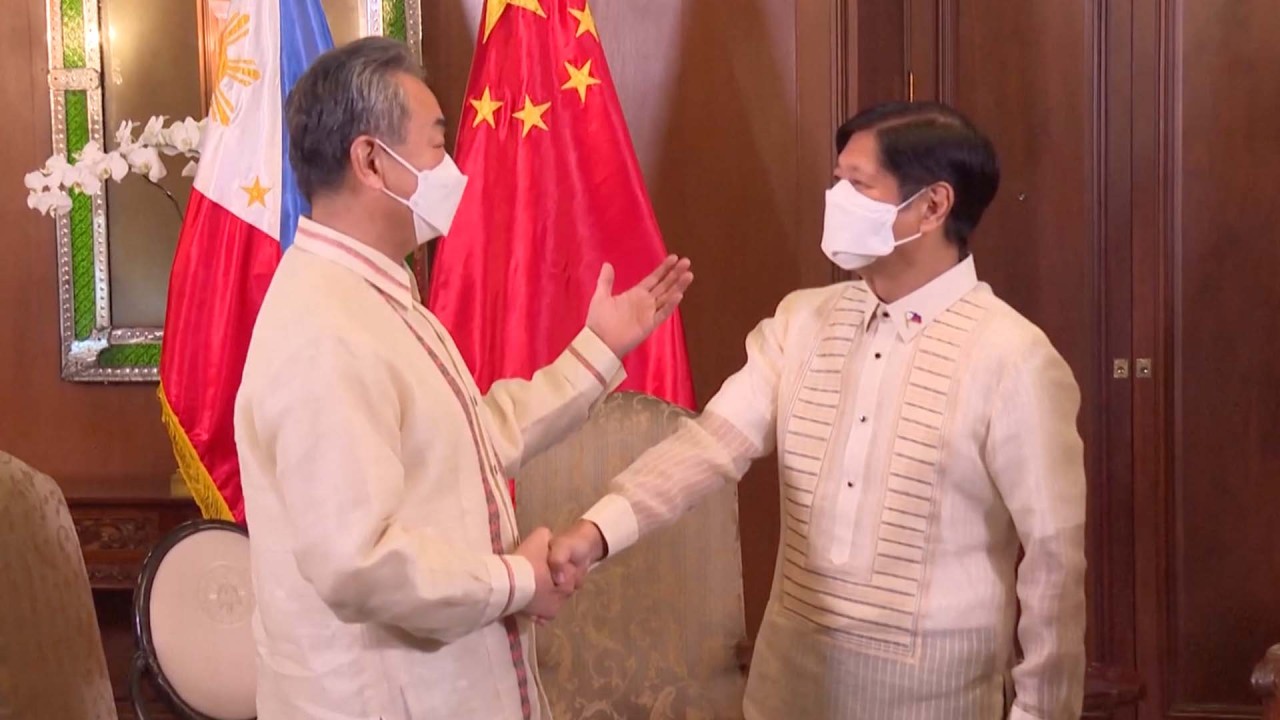
Marcos urged to stick to South China Sea ruling amid Philippines’ ‘sweet spot’ in US-China diplomacy
- The call by defence and security experts comes as Washington renews its pledge to support the Philippines in the event of an ‘armed attack’
- An envoy suggests Asean centrality could form the basis of such a policy, which analysts say would require deft diplomacy with the recognition ‘China is a power to reckon with’
President Ferdinand Marcos Jnr was urged on Tuesday to stick firmly to the South China Sea arbitral ruling won by the Philippines, even as the United States renewed its pledge to support Manila in the event of any “armed attack” in the contested waterway.
The call by defence and security experts came in a forum on Tuesday – the sixth anniversary of the arbitral award issued by the United Nations Permanent Court of Arbitration – held by the Stratbase ADR Institute.
Think tank president Professor Victor Manhit said a recent poll showed 89 per cent of Filipinos wanted Marcos to “assert our rights over the West Philippine Sea” – the name Manila uses to refer to its exclusive economic zone and maritime areas in the South China Sea. The UN award nullified the “nine-dash line”, China’s basis for claiming nearly all of the South China Sea.
Marcos’ work cut out for him, from Philippines’ energy crisis to China oil deal
According to the June 24-27 survey by private pollster Pulse Asia, most respondents wanted the Philippines to strengthen navy and coastguard capabilities (90 per cent), as well as to build alliances with other countries (84 per cent) to better defend the country’s maritime territorial rights, Manhit said.
Murray Hiebert, research director of BowerGroupAsia and author of Under Beijing’s Shadow: Southeast Asia’s China Challenge, said during the forum that the Philippines was “in a very sweet spot” with the new Marcos administration.
“Both China and the US are coming courting, hoping to reboot their relations,” he said.
Hiebert noted that US President Joe Biden was the first to call Marcos to congratulate him on his win, while China’s foreign minister Wang Yi was the first senior official to visit him.
The Chinese embassy in Manila ignored the ruling’s anniversary but in Washington, US Secretary of State Antony Blinken said in a statement: “The United States reaffirms its July 13, 2020, policy regarding maritime claims in the South China Sea. We also reaffirm that an armed attack on Philippine armed forces, public vessels, or aircraft in the South China Sea would invoke US mutual defence commitments under Article IV of the 1951 US-Philippines Mutual defence Treaty.”
The use of the word “South China Sea” was a dramatic sea change for the US since the 1951 Treaty vaguely referred to an armed attack taking place in “the Pacific”. The treaty’s limits were sorely tested in 2012, when the US refused to come to Manila’s aid when a Chinese marine surveillance ship blocked the Philippine navy from arresting Chinese fishermen illegally fishing within the EEZ in Scarborough Shoal.
Marcos says he’ll assert Philippines’ South China Sea rights ‘with a firm voice’
Another first was the statement issued by the new Philippine foreign secretary Enrique Manalo officially hailing the arbitral win for the first time.
“The Award and the United Nations Convention on the Law of the Sea (UNCLOS) are the twin anchors of the Philippines’ policy and actions on the West Philippine Sea,” he said. “It upheld the Philippines’ sovereign rights and jurisdiction in its exclusive economic zone.”
Without naming China, Manalo said the award “affirmed that certain actions within the Philippines’ EEZ violated the Philippines’ sovereign rights and were thus unlawful; that large-scale reclamation and construction of artificial islands caused severe environmental harm in violation of international conventions; that the large-scale harvesting of endangered marine species damaged the marine ecosystem; and that actions taken since the commencement of the arbitration had aggravated the disputes”.
“These findings are no longer within the reach of denial and rebuttal, and are conclusive as they are indisputable. The Award is final ... we welcome the support of a growing list of countries for the Award,” Manalo said.

But how this new foreign policy would take effect was the subject of Tuesday’s forum. Jose Manuel Romualdez, Manila’s envoy to the US and Marcos’ second cousin, batted for Asean centrality in resolving the issue.
According to him, the president “has recognised the significance of the 2016 Arbitral ruling, saying ‘it is not a claim’ but ‘a territorial right’, even going so far as saying that we will not allow a single square millimetre of our maritime rights to be trampled upon”.
The claim came three months after Marcos appeared dismissive of the award. His predecessor, Rodrigo Duterte, belittled it as a scrap of paper he would throw in the wastebasket.
To implement the award, Professor Yusuke Takagi of the National Graduate Institute for Policy Studies suggested that the Philippines could start by expanding its current trilateral coast watch programme with Indonesia and Malaysia in its shared southern border to cover as well illegal, unreported and unregulated (IUUU) fishing in the South China Sea.
What does a Marcos Jnr presidency mean for Asean and democracy in the region?
Lisa Curtis, director of the Indo-Pacific Security Program Center for a New American Security, cautioned that Manila would need “to be a bit subtle” in addressing China’s assertiveness but at the same time not ignore some of China’s activities in the hope it would just go away.
Curtis shared that she had recently met Marcos, who “indicated that the Philippine strategic location is both an opportunity and a challenge”.
Jana Šedivá, Ambassador to Manila for Czech Republic which currently occupies the European Union Council presidency, said the EU was keen since “what happens in the Indo-Pacific has implications for the whole world including Europe”.
For security expert Renato de Castro, the new president’s challenge would be how to “make limited hard balancing comprehensive” while recognising that “China is a power to reckon with”.
He defined this as relying on a “moderate arms build-up and semi-formal alliances such as strategic partnerships that allow joint undertaking and the pooling of resources but not offensive warfare or coordinated military operations”.


